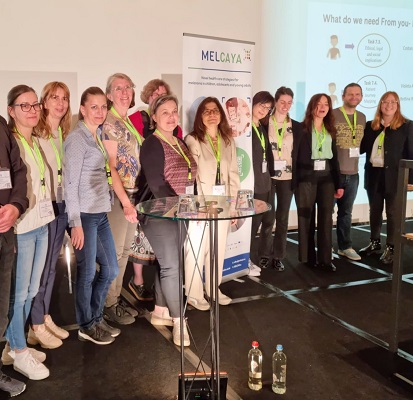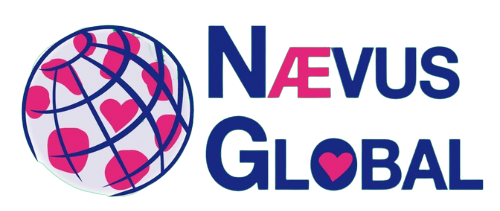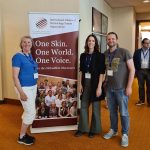MPNE 2023
April 27-30, 2023. Brussels

April 27 to 30, 2023, the Melanoma Patient Network Europe Congress (MPNE) took place in Brussels. It is a congress for doctors, researchers, and patient representatives. This congress has been organized by patient representatives from various countries since 2014. Naevus Global was present at this event.
MelCAYA: research project for melanoma
Naevus Global participates in a large European study MELCAYA. This project investigates melanoma in children and young people (CAYA: Childhood, Adolescence, and Young Adults).
Aim of the project
Melanoma in children and young people is difficult to understand, prevent and diagnose. Innovative melanoma treatments are currently not accessible to young people and children, affecting their chances of recovery and survival. The research focuses on three types of melanoma: Spitz melanoma, melanoma as it occurs in adults, and melanoma in congenital moles (CMN).
It has the following objectives:
Aim of the research
- IDENTIFY
environmental and genetic risk factors for melanoma in CAYA. What are the risk factors for melanoma in children, adolescents, and young adults? How does melanoma develop: from simple nevi to precursor lesions – to malignancy and then – metastases? - ESTABLISH
molecular profiles of progression from benign congenital nevi to melanoma. How to improve histopathological and molecular diagnosis. Building a prognostic model using clinical, dermoscopic, and histopathological images and Artificial Intelligence. - FACILITATE
better international collaboration, standards, and melanoma taxonomy. The creation of a pan-European digital second opinion platform. Validation of melanoma therapies in children, adolescents, and young adults (CAYA) and their efficacy and toxicity, including long-term effects on fertility. - EVALUATE
the clinical efficacy and safety of anti-PD1 antibodies in CAYA melanoma patients. - DEVELOP
an AI-based diagnostic tool to distinguish the images of melanomas from images of nevi or other benign pigmented skin lesions. Building a risk predictor for childhood and youth melanoma by collecting data and training artificial intelligence (AI) algorithms. - CONDUCT
rapid and non-invasive tools for risk and prognosis of melanoma in CAYA. Development of non-invasive diagnostic tools such as the breath analyzer and dermatological melanoma detection patches. - DESIGN
health care system strategies on prevention and diagnosis of melanoma. Implementation of care strategies, so basically, how to put all of the above into practice in a way that benefits patients. - ENSURE
patient research engagement and education throughout the project and its implementation.
Research
The project is complex and has the ambition to address important aspects for patients:
- What are the risk factors for melanoma in children, adolescents, and young adults?
- How does melanoma develop: from simple nevi to precursor lesions – to malignancy and then – metastases?
- How to improve histopathological and molecular diagnosis.
- The creation of a pan-European digital second opinion platform.
- Validation of melanoma therapies in children, adolescents, and young adults (CAYA) and their efficacy and toxicity, including long-term effects on fertility.
- Building a risk predictor for childhood and youth melanoma by collecting data and training artificial intelligence (AI) algorithms.
- Development of non-invasive diagnostic tools such as the breath analyzer and dermatological melanoma detection patches.
- Building a prognostic model using clinical, dermoscopic, and histopathological images and Artificial Intelligence.
- Implementation of care strategies, so basically, how to put all of the above into practice in a way that benefits patients.
Partners in research
We will work together with MPNE (Melanoma Patient Network Europe) and especially with Melanoma Romania. We are the two patient organizations participating in the project to bring our experience, to the patient’s experience. The research is a collaboration with experts from 10 countries in different disciplines (e.g. oncology, pediatrics, ethics, policymaking) and sectors (e.g. academic centers, hospitals, patient associations) on this project:
Hospital Clínic de Barcelona, Eberhard Karls University Tübingen, Aix-Marseille Université, Università degli Studi di Firenze, Università degli Studi di Perugia , German Cancer Research Center , Princess Máxima Center, Karolinska Institute, Istituto Nazionale dei Tumori di Milano, Maria Sklodowska-Curie National Research Institute of Oncology, Leibniz Research Institute for Environmental Medicine in Düsseldorf, Technion- Israel Institute of Technology, Athena Tech, Synyo GmbH, Università Cattolica del Sacro Cuore, Fondazione Policlinico Gemelli, Institut Català d’Oncologia, Instituto de Investigación Biomédica de Bellvitge, Asociatia Melanom Romania, Italian National Agency for Regional Healthcare Services, Institut Curie Paris, Medical University of Gdansk Berlin Charité, Nevus Netwerk Nederland (/Naevus Global).
Three Naevus Global scientific advisors are implicated directly: Dr. Susana Puig (MELCAYA project coordinator), Dr. Josep Malvehy (Spain), and Dr. Heather Etchevers (France). Dr. Miguel Reyes-Múgica (USA), and Dr. Veronica Kinsler (UK) also constitute half of the MELCAYA project’s External Advisory Committee.
The project is coordinated by the Clinical Foundation for Medical Research (Spain). It is funded by Horizon Europe (ambitious research and innovation program of the European Union). The study will run from December 2022 to November 2026.
Read more in the announcement of Hospital Clínic de Barcelona.


